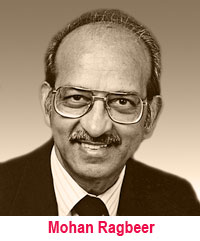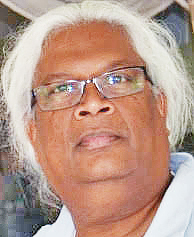Opinions
Babes in the Woods

Guyana is a novice where big business is concerned, with no exposure to the petroleum industry; the oil reserves are putty in the hands of oil giants, whose data are all that Granger and company have. ExxonMobil is both miner (active in 28 countries), and refiner, the world’s largest with 37 refineries in 21 countries, refining 6.3 million barrels daily, and doing as they please, as George Bush told India’s Vajpayee in 2004, “those guys listen to no one”.
Forty years ago, Burnham trashed companies, nationalised those that resisted, and exiled nearly all potential entrepreneurs – a favour to them really, as many have done extremely well in the few decades since they migrated.
The discovery of oil has awakened American vultures to the new sources of flesh, with first-of-a-kind visits by congressmen to Guyana and Suriname, pouncing on them like carrion crows, and meeting secretly with Government officials. Most Americans, even the university-educated, don’t know where Guyana is, and proudly display this ignorance in talking of it as if it were Guinea, or Ghana or New Guinea.
It is sickening to read the comments following articles on the Guyana oil in the NY Times, Wall St Journal etc. Though they are often wrong, Americans rightly compare the likely fate of Guyanese with examples from New Guinea, Nigeria, Chad, and Equatorial Guinea, all “blessed” with oil – (note that in French ‘blessé’ means ‘wounded’). In these countries, Exxon, or its predecessor Esso, had a key role, and has been sued for shady deals in several places. Among the infamous ones was the direct deposit of oil revenue, during Rex Tillerson’s reign, into a personal US account belonging to Teodoro Obiang, President of Equatorial Guinea (EG) which his son Teodorin used to buy a luxury home in California and several very expensive sports cars. Exxon’s defence was that they were given that account number as the government’s. Meanwhile, 25 years after the oil find, despite a GDP of $38,000 per capita, 45% of people are below the poverty line, and denied education, basic health care and immunisations. Teodorin was handed a 3-year suspended sentence in France for money laundering, and today (Sept 16) Brazil detained him and a delegation for undeclared $16M!
Many have questioned the nature of Guyana’s agreement with EM, asserting that Guyana has been short-changed, but one must be cautious. In an instant, US Marines can take over and re-write Guyana’s constitution, permitting American ownership of Guyanese assets and property, as they did in Haiti in 1915, guaranteeing its everlasting poverty.
“We will suffer from that contract for the next 75 years,” said Christopher Ram, Guyanese advocate and accountant.
Spare the fishing rod, spoil the child
 Romeo Kaseram
Romeo Kaseram
It was a remarkable flashback, the moment hanging in the air the way lightning sears an image in the eye so it resonates inside the timelessness occupying the space between the flash and approaching thunder. I stood entranced inside the moment, transfixed by the crack in the firmament brought by this unpredicted leap of imagination.
The trigger for the flashback was in the moment when a stranger, who carrying a length of thin, dried bamboo out of the store, tapped it on the solid floor as if for soundness, the fluidity of its response a similar timeless resonance that lingered inside the noiselessness of
the door as it swung open; then the stranger walked away, carrying the bamboo rod on the shoulder so it did not appear to be a walking-stick, or a cane, but was like a fishing pole. Both the bamboo pole and its stranger then headed into the carpark. In the distance, above a windbreak line of oak trees, the city line rose upwards, its towering buildings looking down with its white, judicial wigs of clouds; just beyond man and pole, vehicles buzzed endlessly and non-stop, whizzing by on the constant of a four-lane roadway.
This stranger was on a fishing expedition; yet the bamboo pole was not meant to be a fishing rod. My mind assessed the possibilities – perhaps it was headed for a large flower pot, to be buried into potting soil constituted with measured teaspoonfuls of laboratory-mixed plant food, there to support with the finality of verisimilitude a simulation of the tropics. Maybe an expensive plant would be bound to it, wound and held in place with camouflaged-green wire simulating the wreathing rootedness of vines. Perhaps the plant finding this favour of presentation was an expensive orchid, transplanted to the north from its rainy ecosystem, uprooted from its nutritive rot somewhere close to the equator.
Despite so much precarity ahead for the cane, or walking stick, or trellis-support that was this dried, price-tagged length of bamboo brought from afar into a metropolis space, yet my mind found fertility. Yet it continued drawing from its rootedness in the past, recalling an unsupervised young boy growing up back home, the adults in the house called away by a day’s work in the canefield; or a caretaker, worn down by the energy of my youth and the draining humidity of the morning, was catnapping in the cradled comfort of a hammock strung in the shade under two matching mango trees.
It was in this tropical space, where to venture out on foot – not beyond a four-lane roadway buzzing with the constant of mobility in vehicular traffic – but to instead cross a rugged, dirt-road track, and then wind through grasses taller than an adventurous boy. It was here where grasshoppers lifted out from the warp and woof of grasslands as if shot out of a spring trap; where birds called to each other in coded warbling, and where the rustle and winding ahead, the dipping and bowing of the seeded stalks as in prayer, warned of either a snake fleeing ahead, or a mongoose in fluid pursuit.
But the objective in the moment of freedom, away from the constrictive gaze of an adult overwhelmed by the demands of the day to entertain a young boy, was to arrive unimpeded, uncalled by an annoyed, following caregiver, and entering the sanctuary of the bamboo grove. It was here where the swish of the grass was replaced by the friction of bamboos rubbing shoulders in camaraderie, the winding of the wind through the thickets a mix of moaning, susurration, and the music of the spheres; and then, as the wind died down, the therapeutic sound of water stumbling over pebbles, smashing into rocks, or beckoning with an airy splashing of fingertips.
Here were ready-made fishing poles jutting out of bamboo-vertebrae, the rods naturally lathed down from the thickness of the handle of a broom to the width of a pencil, each length of bamboo tapered; wound into its fibres was an elasticity of greenery, the test for durability being to bend it so a circle was formed, the tip effortlessly touching the heel. Fasten onto the tip a length of string, attach a pin bent into a hook, then bait and plop it into the water, and what was the world quickly swam out of reach even as eyes closed down with welcome drowsiness.
It mattered not the fish were street-wise, avoiding the bait with the cynicism of the well-fed; it mattered not the string swam away and among the rocks, where the effort to retrieve it returned a straightened pin. What mattered was the detachment from the world, and re-attachment to the timelessness that comes with fishing, and the healing it brings from an untouched, primal space.
However, there was always a price to pay for a fishing expedition, the unit of currency the rod itself, which morphing into a rod of correction, was never spared in teaching about the dangers in this world awaiting an errant young boy, who today still cherishes those stolen moments of timelessness.
